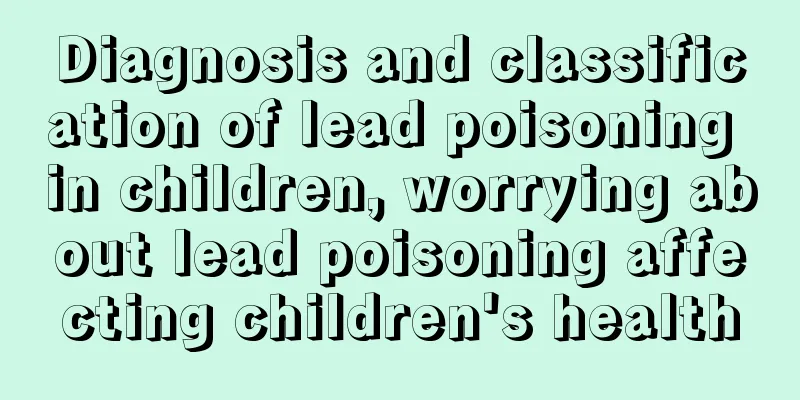Diagnosis and classification of lead poisoning in children, worrying about lead poisoning affecting children's health

|
Because children are young and often cannot take care of themselves, accidents often occur. For example, the diagnosis and classification of lead poisoning in children are quite common in clinical practice. If we find that our children have signs of lead poisoning in life, we must take them to a regular hospital for a physical examination and provide timely treatment. Peripheral blood picture : In the diagnosis and grading of lead poisoning in children, peripheral blood picture examination is a necessary step. If the child shows signs of moderate or above lead poisoning, there will be a large decrease in red blood cells or hemoglobin in the blood, as well as an increase in polychromatic and stippled red blood cells. Checking fluorescent red blood cells is one of the valuable methods for early diagnosis of lead poisoning. The standard is: less than 1% is normal, more than 2% to 10% is a slight increase, and more than 10% is high, but it is a non-specific diagnostic method. Lead determination : A blood lead value of 1.93 μmol/L (30-50 μg/dl) is generally diagnostically significant. However, because lead leaves the blood quickly, this test is only valuable in diagnosing acute poisoning. Generally, when children's blood lead levels exceed 600μg/L, they may show obvious symptoms and signs of neurological damage; if the blood lead level persists above 400μg/L, they may suffer varying degrees of neurological damage. Urinary lead determination can be used as a diagnostic reference, and the normal upper limit is 0.08 mg/L. To check for lead in talcum powder, add a little acetic acid and then drop 1% potassium iodide solution. If a golden color appears, it contains lead. Lead removal test : For children with a history of lead exposure but no obvious symptoms, if the urine lead test is normal, a lead removal test can be performed. Generally, calcium edetate (CaEDTA) 500 mg/m2 is injected intramuscularly once, and urine is collected for the next 8 hours to measure urine lead. If the urine lead excretion for each mg of calcium edetate injected is greater than 1 μg, it indicates that the patient's blood lead concentration exceeds 550 μg/L. Porphyrin determination: The urine and fecal porphyrin quantitative method is more reliable, and the upper limit of the normal value is <0.15 mg/L. The qualitative test for urine fecal porphyrin designed by Benson and Chisolm is relatively simple and can detect children with blood lead levels exceeding 1 mg/L. Erythrocyte protoporphyrin is significantly increased (normal value <400μg/L red blood cells or <3μg/g hemoglobin). There are many ways to diagnose and grade lead poisoning in children. In addition to the above examination items, X-ray examination, cerebrospinal fluid examination, or child stool examination, etc., can determine the grade of child lead poisoning. However, we must actively provide formal treatment after the child shows signs of lead poisoning. Only then can you recover your health as soon as possible. |
>>: What are the treatments for picky eating in children?
Recommend
What to do if children have chicken skin
Children's skin looks more delicate than that...
Is it normal for babies to spit up?
During the growth of a newborn, careful mothers w...
What's going on when the baby has a fever and convulsions?
We rarely see children having convulsions, becaus...
What foods are good for children with anemia?
Many parents take their children very seriously, ...
Good aerobic exercise for kids?
There are many ways to do aerobic exercise. Diffe...
Fruits that two-year-old babies cannot eat
When babies are young, their stomachs and intesti...
How to correct uneven shoulders in children
Uneven shoulders is a problem that troubles many ...
How to treat peeling of children's feet
Our children are our treasures. It is not easy to...
What to do if your child has repeated coughing and wheezing
Many children often cough repeatedly, and the fre...
How to treat baby rubella better
How to treat baby rubella is a problem that many ...
What are the effects of general anesthesia in children?
We all know that when we need to perform some sur...
Baby's redness and swelling after vaccination
In addition to checking all aspects of the baby&#...
What to do if children have scalp dermatitis?
You can tell from so many anti-dandruff shampoo a...
What will happen if dampness and toxins are present in the baby’s body? Please take note of these symptoms
If there is dampness and toxins in the baby's...
How to identify baby's laryngeal softening
Most people may not be particularly aware of the ...









